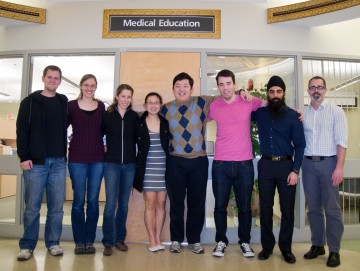The UBC Academic Learning Community, or ALC, is a prototypical-learning model in which medical students complete part of their pre-clinical training within in a local hospital. The first of its kind was implemented at Royal Columbian Hospital in January 2013, and was piloted by seven Vancouver-Fraser medical students during the second term of their first year of medicine. Studying in an ALC offers many benefits to medical students, and as I reflect back on my experience as an ALC student, I think about how fortunate I was to take the plunge into this prototypical model of medical education.
As a member of the hospital community, I have had the unique opportunity to interact and learn from medical students and residents at all levels of training, and to participate in extra-curricular activities such as resident teaching sessions and afternoon rounds. Longitudinal courses such as family practice and clinical skills were structured differently to provide a unique learning experience. Students in an ALC family practice follow a cohort of patients throughout the term to gain an appreciation for the importance of continuity of care and the doctor-patient relationship in general practice. Clinical skills are taught by local clinicians in smaller group sizes, allowing more one-on-one time and earlier introduction to preceptors we will interact with during our clerkship years. Many of the clinical skills sessions are interactive and provide perspective on the skills expected of third year medical students.
One of my most memorable experiences as an ALC student is a clinical skills session that took place in the hospital wards. We were assigned two patients with GI complaints, and asked to perform a full history and physical exam. After completing the assignment, we were asked to meet in the ER consult room and present our cases to the group as if we were on rounds. Our preceptor provided feedback on our presentations, and asked that we each offer a differential diagnosis and suggestion for management. Seemingly, in addition to gaining clinical skills experience, I had also learned how to develop a clinical approach to patients with GI complaints and how to present cases to an attending physician in a concise and clear manner.
The biggest advantage to studying in an ALC, however, has been the opportunity to interact with our clinician advisors. The clinician advisors wear many hats. They are mentors, teachers, and friends. They assist with career planning, connect students with shadowing opportunities, and help those interested get involved in research. They are actively involved in our curriculum. They teach PBL, sit in on lectures, and organize many clinical activities related to the topics discussed during the week.
Overall, I am very satisfied with my experience as an ALC student. I have had the good fortune of being able to study in the same site where I will continue on to study as a third year student. Now in my second year of medicine, I have decided to return to RCH to complete my last year of pre-clinical medicine as an ALC student.
